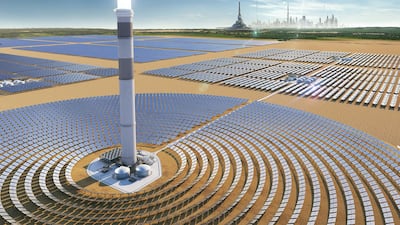Covid-19 has dominated our lives in 2020, impacting how we live and work and in turn our energy use. This has resulted in an estimated 8.8 per cent decrease in global CO2 emissions in the first half of this year.
As we emerge return to some form of normality as industries power up and operate once again, this decrease in CO2 levels may well be challenged but we have an opportunity to forge a greater focus on a more sustainable future.
As we marked World Energy Day last week, which was an initiative endorsed through the Dubai Declaration of 2012, there was an opportunity to reflect on the action needed to preserve a world for future generations to live in a clean, healthy, and safe environment.
In the UAE, there are significant steps being taken to enable the transformation towards a sustainable green economy through a range of initiatives such as the Mohammed bin Rashid Al Maktoum Solar Park, which is the largest single-site solar park in the world. The park plays an active role in providing clean energy, which currently forms about 9 per cent of the energy mix for Dubai. With a significant focus to reduce carbon emissions, Dubai reduced its emissions by 14 million tonnes last year, a 22 per cent reduction on the previous year.
Through the implementation of clean technologies – or cleantech as it is more commonly known – great strides can be achieved in our journey to a more sustainable future. Through greater collaboration across public-private institutions, we can bring highly innovative advances to solve our sustainability challenges as well as saving money through efficiencies gained.
Dubai's Clean Energy Strategy 2050 aims to reduce energy and water consumption by 30 per cent by 2030 through initiatives revolving around green building regulations and retrofits, district cooling, wastewater reuse and standards and labels for appliances and lighting systems. The opportunity ahead through collaboration is substantial.
Dramatic annual savings can be achieved by a company transitioning from traditional light bulbs to more energy-efficient LED lighting that can be further enhanced through sensor-driven connections to maximise their use. These solutions are both good for the environment through reduced energy consumption and have a significant impact on reducing a company's utilities bills, proving to be a win-win situation.
Ireland is fast becoming an international hub for the cleantech global market. Over the past decade, the sector has grown substantially. There are now about 500 cleantech companies operating in Ireland with many of these exporting to global markets such as the Middle East. Globally, the Irish cleantech sector has seen exports increase to nearly $535 million in 2019, up from $450 million the previous year. Not only is this good news for the Irish economy, which saw a 9 per cent increase in cleantech jobs created last year, it means innovative Irish cleantech is having a global impact, helping to build a better, more sustainable world.
At Enterprise Ireland, the government agency that supports Irish businesses on the international stage, we have a specialist sector-specific team based in Dublin supporting cleantech companies around the world. This week, we are supporting several Irish cleantech companies at Dubai's Wetex 2020 event, many of whom are already operating in the UAE and the wider region to help public and private entities to become more sustainable and energy efficient.
The drive to innovatively and competitively manage climate change, grow sustainably, generate clean energy and manage scarce natural resources will continue to witness rapid growth in the demand for cleantech solutions, including here in the region as governments and companies forge ahead towards a more sustainable and prosperous future.
Through collective action driven across the public and private sectors in the decade ahead, we will witness advances in our green economy, enabled by global cooperation. With the Middle East being a priority market for Ireland, more and more Irish companies will provide cleantech solutions to help form a better working world for generations to come.
Róisín White Barrett is a market advisor for the Middle East & North Africa at Enterprise Ireland

